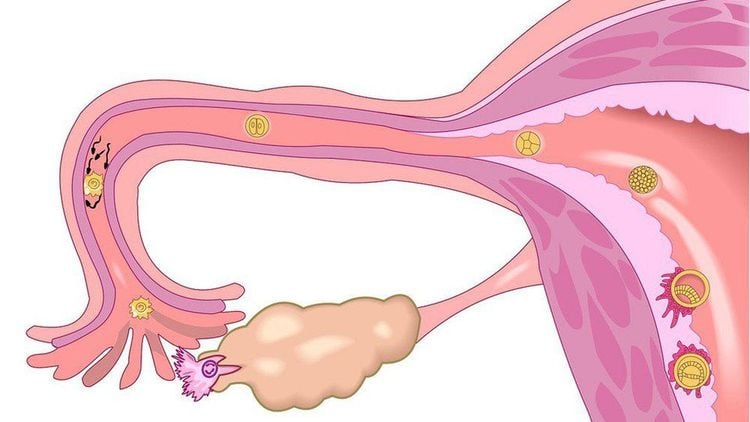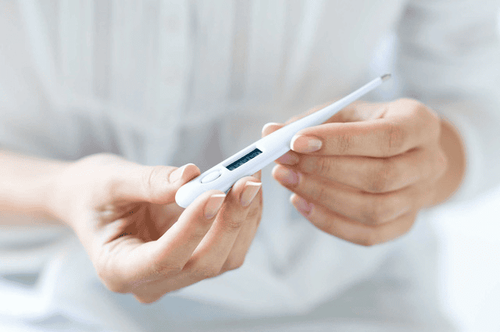This article was professionally consulted by Doctor Nguyen Chi Quang, Department of Obstetrics and Gynecology - Department of Obstetrics and Gynecology - Vinmec Central Park International General Hospital.
For unavoidable reasons, many women who are still in their sexual age have to have their ovaries removed, which causes psychological fear of affecting the sexual life of the couple later on. In fact, removing the ovaries depends on many other factors before deciding whether it will seriously affect the reproductive and sexual functions of women or not.
1. Functions of the ovaries
The ovaries have two main functions: the exocrine function of producing eggs and the endocrine function of secreting hormones to help women develop and maintain their female gender and sexual desire. The cells of the ovaries secrete three sex hormones including: the inner follicle secretes estrogen, the granulosa cells of the corpus luteum secrete progesterone, and the cells of the ovary hilum secrete androgen (the common name of testosterone - a male sex hormone).
The role of hormones secreted by the ovaries:
- Estrogen plays a role in forming secondary sex characteristics of women during puberty and in the maturation and maintenance of the reproductive organs in their mature functional state.
- Progesterone prepares the uterus for pregnancy, and secretes milk in the mammary glands. The functions of progesterone and estrogen promote changes in the endometrium during a menstrual cycle
- Of which, testosterone is the main factor determining sexual desire.
Oophorectomy is a surgical procedure to remove one or both ovaries. There are two ways to perform an oophorectomy: open surgery, or laparoscopic oophorectomy, which is minimally invasive, less painful, and easier to recover from. Depending on each specific case, the doctor will choose the appropriate method.
Oophorectomy is a consequence of problems with the reproductive organs such as ovarian cancer, endometriosis, tumors or cysts, ovarian abscesses, etc. People at high risk of ovarian cancer or breast cancer can also reduce their risk of disease with this procedure.
2. Effects of ovarian removal
Is ovarian removal harmful? This is a concern for women because after ovarian removal, ovarian removal can affect menstruation, the ability to conceive and cause some symptoms of premenopause.
2.1 Effects on menstruation
If one ovary is removed due to diseases such as ovarian cysts, ovarian abscesses, etc., after removing one ovary, the remaining ovary still ensures the ability to secrete hormones and the woman still has monthly menstruation.

However, due to some reasons such as ovarian cancer, prevention of high risk of breast cancer or ovarian cancer, both ovaries must be removed, there will be no monthly menstruation.
Removing both ovaries will cause immediate menopause. As a result, women may suddenly experience typical symptoms of menopause such as hot flashes, memory problems, mood swings, vaginal dryness... instead of a natural and gradual transition. In cases of severe discomfort, hormone replacement therapy can help relieve symptoms.
2.2 Ability to get pregnant after oophorectomy
The ability to get pregnant after unilateral oophorectomy is still intact. Because the 2 ovaries function independently, when one is removed, the other side can still maintain fertility.
Removing both ovaries does not allow for successful natural conception. If you want to have children, you can still get pregnant through in vitro fertilization by considering egg freezing before undergoing oophorectomy or egg donation.
2.3 How does complete oophorectomy affect your sex life?
Removing both ovaries significantly reduces sexual desire, although testosterone is the hormone that maintains sexual desire in both men and women, not only secreted by the ovaries but also by the adrenal glands, but the lack of estrogen due to the removal of the ovaries will cause dryness and atrophy of the vagina, which will greatly affect sexual desire
In addition, in some cases of benign tumors in both ovaries, the doctor does not need to remove both ovaries but only surgically removes the tumor, still trying to preserve the healthy tissue of the ovaries to maintain endocrine function. The remaining healthy tissue can still function to compensate, does not cause endocrine deficiency and does not affect sexual life.
After removing the ovaries, the lack of female sex hormones can cause vaginal dryness and pain during intercourse. To limit this condition, alternative lubricants can be used.
Removing all ovaries is a last resort surgery that is usually only applied rarely in cases of gynecological cancer. However, after removing both ovaries, women can still use hormone replacement therapy to provide additional hormones to maintain a woman's figure, avoid vaginal dryness, prevent osteoporosis, and maintain sexual desire. However, the use of hormone replacement therapy (HRT: hormonal replaced therapy) is relatively complicated, with a slightly increased risk of breast cancer and endometrial cancer. Women can come for examination and receive full advice on the benefits and risks with obstetricians. At Vinmec Hospital, there are full facilities for early screening of breast and uterine cancer, and provide full supplementary hormones in cases where women have had both ovaries removed.
Before becoming an Obstetrician and Gynecologist at Vinmec Central Park International General Hospital, Dr. Nguyen Chi Quang worked at Tu Du Hospital and University of Medicine and Pharmacy Hospital, Ho Chi Minh City. Dr. Quang has many years of profound professional experience and strengths in treating obstetrics and gynecological diseases such as:
- Laparoscopic surgery for uterine fibroids
- Laparoscopic surgery for ovarian tumors
- Laparoscopic surgery for genital prolapse
To arrange an appointment, please call HOTLINE or make your reservation directly HERE. You may also download the MyVinmec app to schedule appointments faster and manage your reservations more conveniently.















